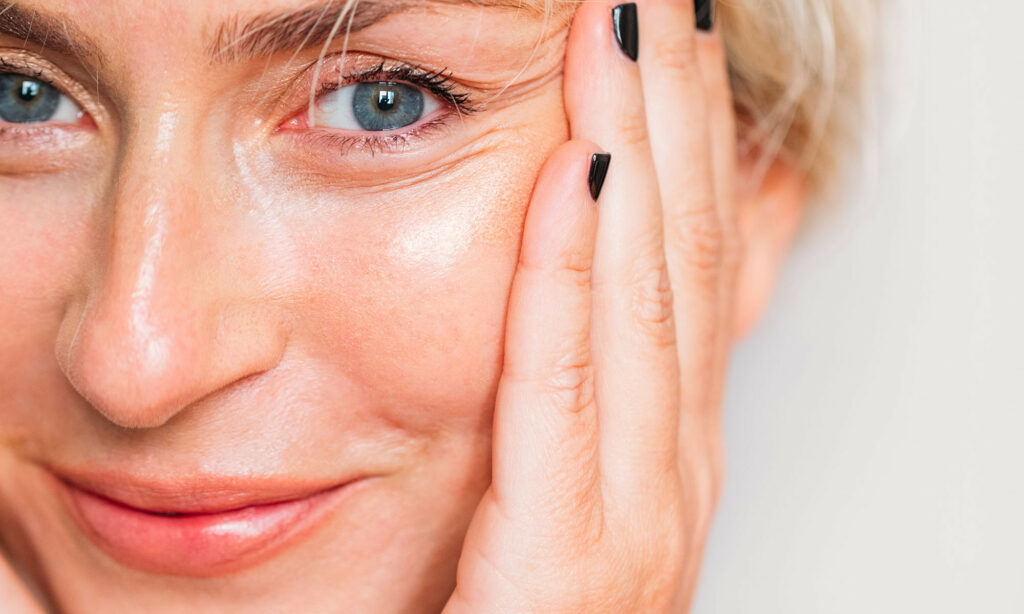Where did all our collagen go?

Our skin needs collagen to give it its firmness and bounce. Learn more about what happens to collagen through menopause and what you can do to support it.
What is collagen?
Collagen is the most abundant protein in the human body, accounting for about 30% of total protein mass. It is a fibrous, structural protein that is a key component of your skin, bones, tendons, cartilage and smooth muscle such as the pelvic floor. It’s a bit like scaffolding for your body, providing strength and support and helping to maintain tissue shape and integrity.
What happens to collagen as we age?
Over time our collagen levels decline. This starts in our mid 20s - from the age of 25, our collagen levels fall by approximately 1.5% a year. Why is this?
There are certain factors which reduce collagen production and others that damage existing collagen
Less collagen gets produced thanks to:
Decreased fibroblast activity (fibroblasts are the cells that produce collagen)
Hormonal changes, particularly the decrease in oestrogen levels that occur with menopause. Oestrogen plays a critical role in maintaining healthy, vibrant and youthful-looking skin. It activates those fibroblasts and also keratinocytes. In turn, these skin cells produce collagen, elastin and hyaluronic acid, all of which help maintain the skin’s glow and bounce. During the 5 core years around perimenopause and menopause, women can experience up to 30% loss in collagen.
Poor diet and excess alcohol.
Some medical conditions, such as autoimmune diseases.
Stress - chronic stress and increased cortisol levels.
Collagen gets damaged by:
Free radicals (produced in the body through metabolic processes as well as via exposure to pollution and cigarette smoke).
UV radiation from the sun
A diet high in sugar which causes glycation
A diet high in processed foods which can cause inflammation in the body
Chronic stress.
What happens when collagen levels begin to decline?
Signs of collagen loss include ageing skin appearance with loss of elasticity, fine lines, wrinkles, dullness and dehydration. Other problems include joint pain, stiffness and loss of bone density. Sagging skin on the face can be a double whammy of weaker skin and loss of bone density in the jaw and chin.
What can you do?
Your body benefits from collagen – this isn’t just about wrinkles on your face. So, what can you do to support your existing collagen production or even boost it?
Watch out for those lifestyle choices that damage collagen. Sunbathing, excess sugar, excess alcohol and smoking will all take their toll on your skin apart from their impact on your overall health.
Ensure you are getting enough protein in your diet. Collagen is a protein after all, so making sure your body gets enough amino acids for its production is key. Consume vitamin C rich foods (eg. citrus fruits) as vit C supports collagen synthesis.
You can discuss using HRT to replace your oestrogen with your healthcare provider who will discuss its benefits vs possible risks.
Manage your stress levels to avoid cortisol imbalances which can lead to reduced collagen levels.
Take a collagen supplement. Many people have now embraced collagen supplementation as a way of combatting the effects of collagen loss during the menopause. Remember to check with your doctor if you have or have had cancer before you take a collagen supplement.
When choosing a collagen supplement, look for the following ingredients: marine collagen peptides (which stimulate the skin’s natural collagen production); multi-molecular hyaluronic acid complex (which supports optimal hydration levels) and natural astaxanthin (which helps to prevent the visible signs of premature ageing). It's also important that any collagen supplement you take is able to travel through the acidic environment of the stomach and reach the small intestine where it can get to work.
At Ingenious, we’ve spent 20 years of scientific research to create a collagen supplement that delivers this triple active formula, and also uses a plant cellulose protection capsule to shield collagen peptides as they travel through the stomach to optimise their effectiveness.
For more details see: www.feelingenious.com

Stay up to date with the latest menopause news by signing up to our mailing list
Newsletter Sign-up (popup)
Stay up to date with the latest menopause news